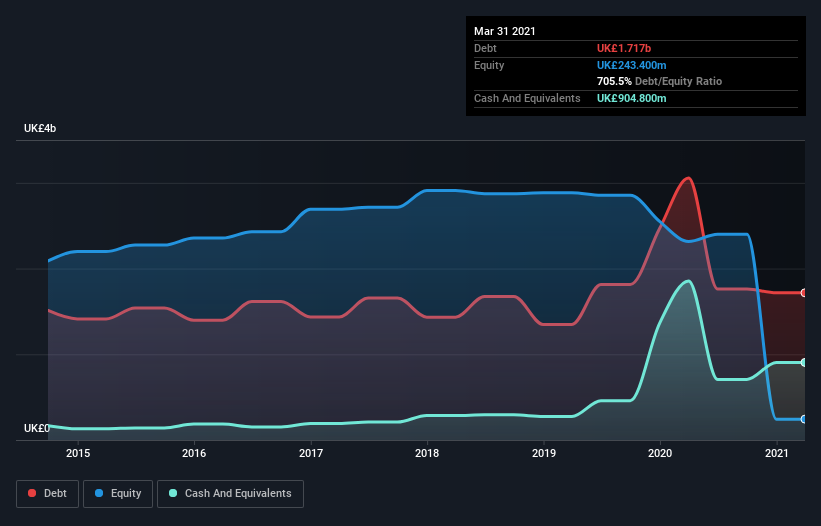- United Kingdom
- /
- Aerospace & Defense
- /
- LSE:BAB
Is Babcock International Group (LON:BAB) A Risky Investment?

The external fund manager backed by Berkshire Hathaway's Charlie Munger, Li Lu, makes no bones about it when he says 'The biggest investment risk is not the volatility of prices, but whether you will suffer a permanent loss of capital.' It's only natural to consider a company's balance sheet when you examine how risky it is, since debt is often involved when a business collapses. As with many other companies Babcock International Group PLC (LON:BAB) makes use of debt. But the more important question is: how much risk is that debt creating?
When Is Debt Dangerous?
Generally speaking, debt only becomes a real problem when a company can't easily pay it off, either by raising capital or with its own cash flow. Part and parcel of capitalism is the process of 'creative destruction' where failed businesses are mercilessly liquidated by their bankers. However, a more usual (but still expensive) situation is where a company must dilute shareholders at a cheap share price simply to get debt under control. By replacing dilution, though, debt can be an extremely good tool for businesses that need capital to invest in growth at high rates of return. When we think about a company's use of debt, we first look at cash and debt together.
Check out our latest analysis for Babcock International Group
What Is Babcock International Group's Debt?
The image below, which you can click on for greater detail, shows that Babcock International Group had debt of UK£1.72b at the end of March 2021, a reduction from UK£3.06b over a year. However, because it has a cash reserve of UK£904.8m, its net debt is less, at about UK£812.5m.

A Look At Babcock International Group's Liabilities
Zooming in on the latest balance sheet data, we can see that Babcock International Group had liabilities of UK£2.11b due within 12 months and liabilities of UK£2.27b due beyond that. Offsetting these obligations, it had cash of UK£904.8m as well as receivables valued at UK£717.0m due within 12 months. So it has liabilities totalling UK£2.76b more than its cash and near-term receivables, combined.
Given this deficit is actually higher than the company's market capitalization of UK£1.88b, we think shareholders really should watch Babcock International Group's debt levels, like a parent watching their child ride a bike for the first time. In the scenario where the company had to clean up its balance sheet quickly, it seems likely shareholders would suffer extensive dilution. There's no doubt that we learn most about debt from the balance sheet. But it is future earnings, more than anything, that will determine Babcock International Group's ability to maintain a healthy balance sheet going forward. So if you're focused on the future you can check out this free report showing analyst profit forecasts.
In the last year Babcock International Group had a loss before interest and tax, and actually shrunk its revenue by 5.6%, to UK£4.2b. That's not what we would hope to see.
Caveat Emptor
Over the last twelve months Babcock International Group produced an earnings before interest and tax (EBIT) loss. Its EBIT loss was a whopping UK£346m. Considering that alongside the liabilities mentioned above make us nervous about the company. It would need to improve its operations quickly for us to be interested in it. For example, we would not want to see a repeat of last year's loss of UK£1.7b. And until that time we think this is a risky stock. The balance sheet is clearly the area to focus on when you are analysing debt. But ultimately, every company can contain risks that exist outside of the balance sheet. For instance, we've identified 2 warning signs for Babcock International Group that you should be aware of.
Of course, if you're the type of investor who prefers buying stocks without the burden of debt, then don't hesitate to discover our exclusive list of net cash growth stocks, today.
If you decide to trade Babcock International Group, use the lowest-cost* platform that is rated #1 Overall by Barron’s, Interactive Brokers. Trade stocks, options, futures, forex, bonds and funds on 135 markets, all from a single integrated account. Promoted
Valuation is complex, but we're here to simplify it.
Discover if Babcock International Group might be undervalued or overvalued with our detailed analysis, featuring fair value estimates, potential risks, dividends, insider trades, and its financial condition.
Access Free AnalysisThis article by Simply Wall St is general in nature. We provide commentary based on historical data and analyst forecasts only using an unbiased methodology and our articles are not intended to be financial advice. It does not constitute a recommendation to buy or sell any stock, and does not take account of your objectives, or your financial situation. We aim to bring you long-term focused analysis driven by fundamental data. Note that our analysis may not factor in the latest price-sensitive company announcements or qualitative material. Simply Wall St has no position in any stocks mentioned.
*Interactive Brokers Rated Lowest Cost Broker by StockBrokers.com Annual Online Review 2020
Have feedback on this article? Concerned about the content? Get in touch with us directly. Alternatively, email editorial-team (at) simplywallst.com.
About LSE:BAB
Babcock International Group
Engages in the design, development, manufacture, and integration of specialist systems for aerospace, defense, and security in the United Kingdom, rest of Europe, Africa, North America, Australasia, and internationally.
Very undervalued with solid track record.
Similar Companies
Market Insights
Community Narratives


